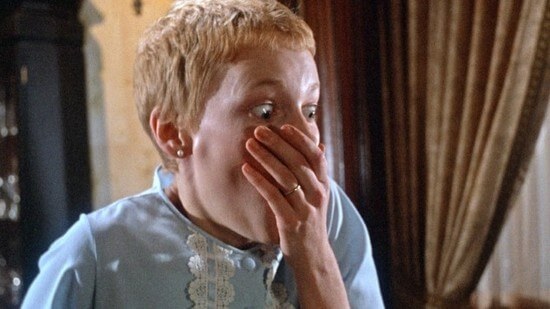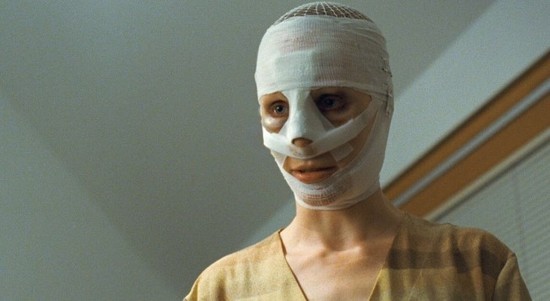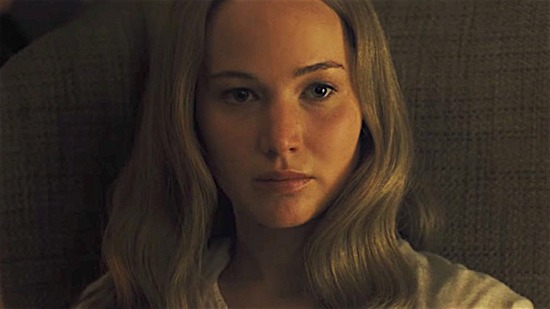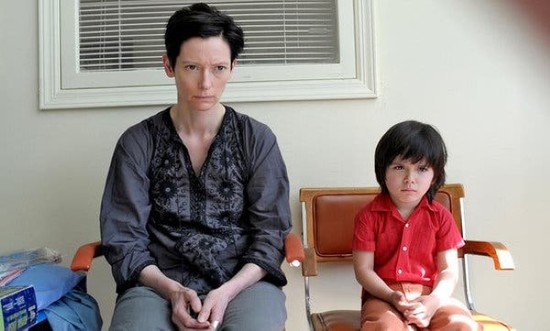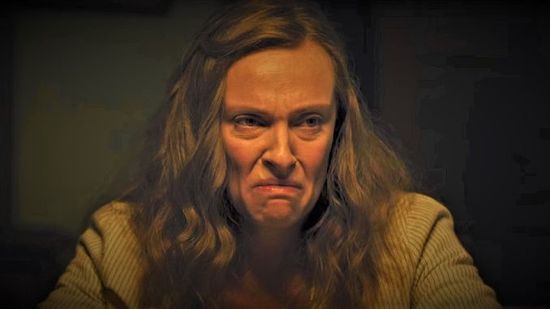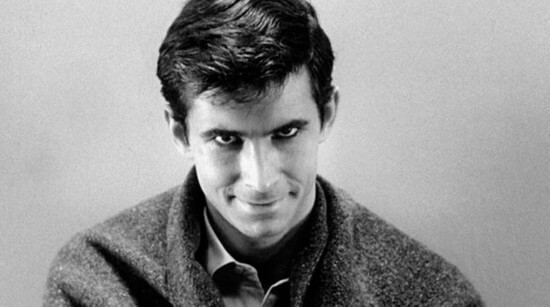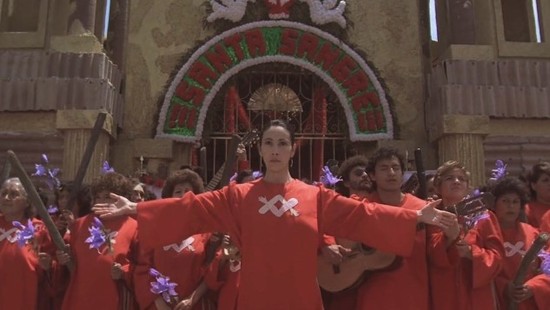The Best Mommy Horror Movies
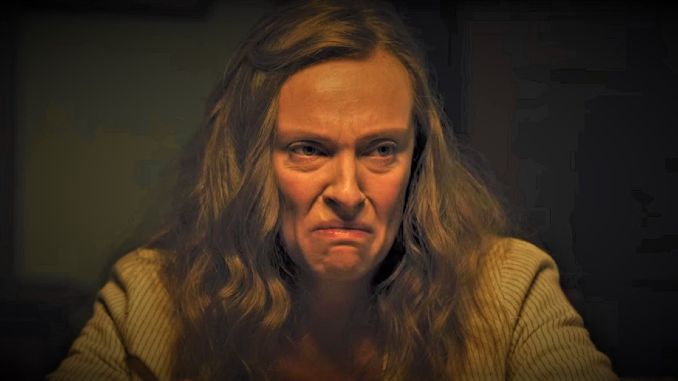
Mothers and maternal figures have earned a reputation for stepping up to the plate and doing what needs to be done for their children in times of extreme hardship. Mothers are icons of warmth, affection, nurturing, protective instinct and unconditional love. In Catholicism, the Mother is so without fault that she remains a virgin despite her pregnancy. In popular music, she is a beacon of strength, a woman meant to be honored: “Dear Mama / Sweet lady / Place no one above ya (You are appreciated)” Her universal admiration makes it difficult, and somewhat sacrilegious, to speak out against her—even when it’s necessary. I’m Glad My Mom Died, a new memoir by Jennette McCurdy, has garnered mixed media attention for these reasons, with some expressing their disapproval for the blunt title and many more finding themselves intrigued by McCurdy’s candid discussion of her less-than-ideal mother. McCurdy deals with what a mother should be, and the reality of who her mom actually was: A nuanced individual in direct conflict with our dominant narrative. It’s a cathartic, well-timed work with immense potential to start honest conversations on what it means to have, and be, imperfect mothers.
Happening simultaneously to this cultural discourse are political rulings that only intensify the complexities surrounding motherhood. Since Roe v. Wade was overturned earlier this year, 15 states have ceased nearly all abortion services, further complicating what it means to become a mother today and for generations to come. Although these messy topics—Bad Moms, forced pregnancies and fears around motherhood—can be difficult to have in the mainstream, focused explorations into these issues have long existed in the anarchical, transgressional space that is genre cinema. For this reason, we have rounded up the best horror films where the source of abject comes from pregnancy, a maternal figure or motherhood itself.
Here are 10 of the best Mommy Horror films:
1. Alien (1979)Director: Ridley Scott
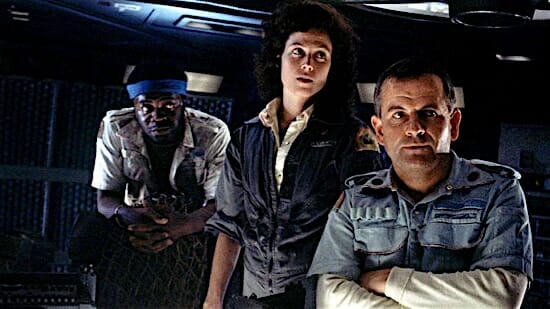
Alien is most recognizably a tale about human morality, modernization and the ethics of technology. The film, as a standalone piece, may not outwardly center a horrific mother figure, but its inclusion on this list becomes clear when observing the work through the framework of Barbara Creed’s 1993 manuscript The Monstrous-Feminine. Creed had a desire to step away from conventional film analysis that mostly considered women protagonists as victims in horror cinema and instead observed the manners in which the female reproductive body itself became the prototype for monsters. Of her many monster types—including the monstrous womb, vampire, possessed monster, witch and castrating mother—Creed identifies the archaic mother as the horrific presence haunting the characters and landscapes of Alien.
The Monstrous-Feminine describes the archaic mother as a type of revolting femininity whose “presence forms a vast backdrop for the enactment of all events.” Symbolized by her absence, the archaic mother is a malevolent maternal force whose presence provokes an impending sense of death as she serves as a reminder of birth and mortality. In Alien, this immense female presence is strongest felt when the crew of the Nostromo are left to navigate the proper actions to take in response to an extraterrestrial organism that has attached itself to the face of one of their unit members. Beginning outside in the dark, rocky landscape, the sequence opens with a shot of the alien spacecraft. Pulling out to reveal the vastness of the ship as it sits motionless upon the ground, the scene assumes a paradoxical position between movement and absolute stillness. This slow camera move creates the presence of somebody—or something—lurking within the space. The mysterious spacecraft itself, mountainous and mystifying in its physical greatness, signifies an indisputable existence of an Other as it raises questions about its creator. Auditorily, the start of this scene cues us into the presence of the archaic mother as its images are overlaid with the sound of ominous wind. Sounding as if the wind is being pulled into a vacuum and disappearing, the aural landscape fulfills the paradox of simultaneous presence and absence.
As the scene continues, the crew find themselves back inside their ship with Kane (John Hurt), who has a facehugger gripped tightly around his space gear. It cuts to an insert of Kane’s helmet as other crew members work to remove the headgear from his face. Smoothly gliding a white tool over the round curves of the helmet, the image becomes reminiscent of a doctor performing an ultrasound on a gelled up, pregnant stomach. This imagery speaks to a rebirth of Kane as he has been transformed through the alien inhabiting his face. Only, this rebirth is rooted in horror as we bear witness to the cracking open of the helmet shell to reveal the facehugger. Kane is hatched, not birthed, suggesting a perverse mutation of his body and being. He becomes a child of the archaic mother, but he is also made feminine himself through the penetration of his mouth by the alien creature.
Within the framework of The Monstrous-Feminine, which contends that femininity itself is seen as monstrous in film, we abject the facehugger, not because it looks slimy or unpleasant, but because it symbolizes the female reproductive system as it wields the powers to birth and feminize men through penetration.
2. Rosemary’s Baby (1968)Director: Roman Polanski
Moving away from symbolic births and towards films that explore the terrors of pregnancy in a more literal manner, we have Rosemary’s Baby. The psychological horror follows Rosemary (Mia Farrow) and Guy Woodhouse (John Cassavetes), a young married couple starting their lives together. We watch the pair move into an eerie New York City apartment and discuss starting a family. After a hazy night filled with demonic visions, Rosemary does in fact become pregnant. But as her pregnancy progresses—and the expecting mother develops extreme paranoia and a worrying appetite for raw meat—she begins to suspect something is seriously wrong with her child-to-be. The film’s twist ending, and thematic interests as a whole, paint a tragic story about a young woman who was failed by her spouse, doctors and neighbors, the people meant to protect her. It’s a horrifying tale about consent (ironic, given the predatory director), abuse and the evils that can arise when one loses agency over their body and has their womb hijacked in the name of religion.
3. The Brood (1979)Director: David Cronenberg
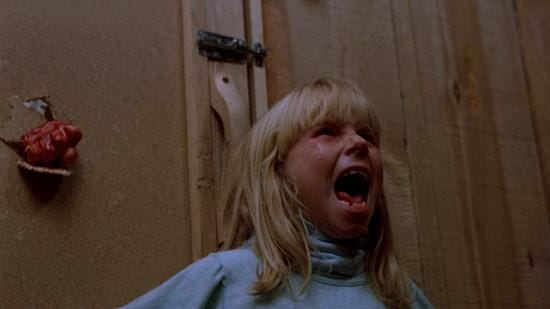
In keeping with the theme of twisted births, we have The Brood, an ultimate work in the maternal horror subgenre and my personal favorite Cronenberg. The Canadian exploitation film centers Nola Carveth (Samantha Eggar), a wrathful mother trying to heal from childhood trauma. This quest for healing has led her to undergo experimental psychoplasmic treatment under the care of Dr. Hal Raglan (Oliver Reed), a mad scientist type who keeps her isolated from her husband and parents. Raglan’s conversion therapy encourages the release of intense rage to remedy his patients’ disordered mental health. In an especially revealing scene, Dr. Raglan provokes Nola while pretending to be her daughter Candy (Cindy Hinds). As Candy, he asks the mother if she’s ever physically abused him. When she assures him that mothers don’t hit their children, he pushes harder until she explodes: “They sometimes do. Sometimes, but then they’re bad mummies. They’re fucked-up mummies. Like mine was. Fucked-up and bad.” This sequence acts as a double admission, with Nola speaking to the abuse she experienced as a child at the hands of her own mother and the abuse she now subjects Candy to.
As Nola becomes angrier, her rage begins to manifest itself physically. She starts to birth frightening, mutated creatures that resemble her young daughter. When these anti-children take violent action on Nola’s behalf, The Brood becomes a disturbing case study about the ways in which unresolved trauma can be passed down from generations and how Bad Moms can arise as a result.
4. The Babadook (2014)Director: Jennifer Kent
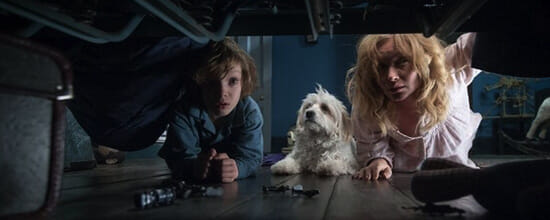
Similarly to the The Brood, Jennifer Kent’s The Babadook centers an emotionally and psychologically distressed mother struggling to manage her decaying mental state and motherly duties—this time after the traumatic passing of her husband. The Australian film follows Amelia (Essie Davis), a single mom who, like Nola, becomes plagued by the physical incarnation of her trauma. In The Babadook, Amelia’s depression, anxieties and frustrations with single motherhood come to life as Mister Babadook, a pale-faced, top-hatted bogeyman.
At times, Amelia lets the Babadook get the best of her, allowing its sinister presence to make her behave like a Bad Mom. But where The Brood sees Nola descend entirely to madness, Kent’s film watches Amelia’s efforts to tame the forces that haunt her. The Babadook is a powerful work about what it means to mother, nurture and love in the midst of immense personal loss and troubled mental health—a work that believes in the goodness of humankind to overcome and move forward in the face of adversity.
-

-

-

-

-

-

-

-

-

-

-

-

-

-

-

-

-

-

-

-

-

-

-

-

-

-

-

-

-

-

-

-

-

-

-

-

-

-

-

-

